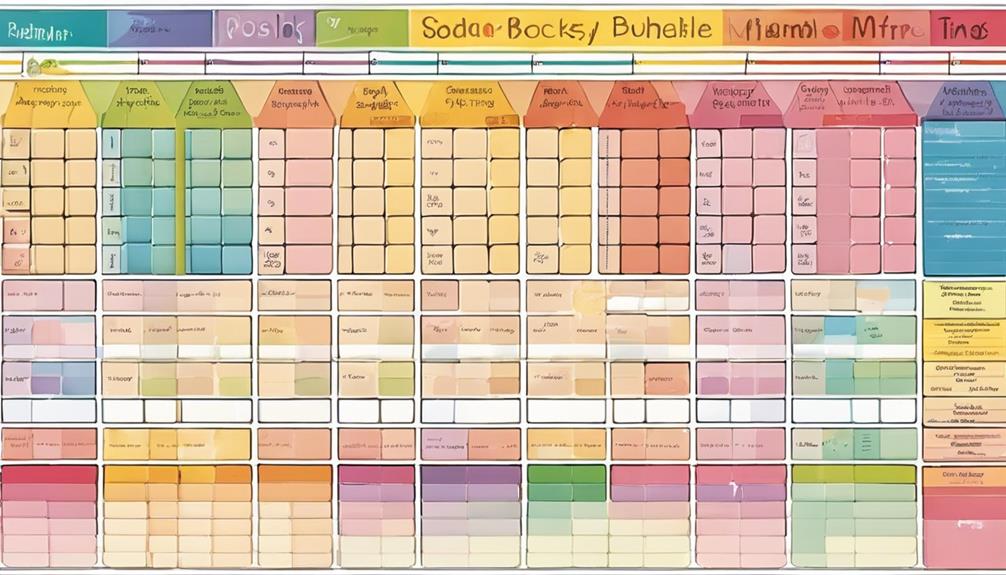Mastering the delicate balance of nurturing our 3-month-olds can be both rewarding and challenging. When it comes to scheduling formula feedings, having a clear guide is essential.
However, the key to revealing a harmonious feeding routine lies not only in the schedule but also in understanding the nuances of our little one's needs. Join us as we explore the intricacies of crafting a feeding schedule that not only nourishes but also nurtures our babies, setting the stage for their healthy growth and development.
Key Takeaways
- Feed your 3-month-old every 3 hours, offering 4-6 ounces per feeding.
- Adjust formula amounts based on weight, aiming for 2½ ounces per pound daily.
- Establish a consistent feeding routine by recognizing hunger cues and responding promptly.
- Overcome feeding challenges by gradually introducing bottle feeding and adapting techniques to the baby's cues.

MAM 6oz Premium Glass Wide Neck Baby Bottle with Slow Flow Breastfeeding-Like Silicone Nipple, Easy to Clean,BPA Free, 0+ Months, Easy Switch Between Breast and Bottle, Made in Europe, 3 Pack Boy
PREMIUM BOROSILICATE GLASS: Manufactured in Europe from shatter resistant baby safe premium borosilicate glass that is scratch and…
As an affiliate, we earn on qualifying purchases.
As an affiliate, we earn on qualifying purchases.
Recommended Feeding Times for a 3-Month-Old
At 3 months old, babies typically feed every 3 hours during the day to support their growing needs and development. It's important to follow a feeding schedule that aligns with their natural rhythm. Understanding how much milk to offer is critical for their health.
A professional can guide parents on the right amount to feed their infant formula. Ensuring the baby is getting enough nourishment is a top priority. Offering a cup of around 4-6 ounces per feeding can help meet their growing requirements.
Observing how often and how much the baby feeds is key to their well-being. By keeping track of their feeding patterns, caregivers can guarantee the baby is getting the necessary nutrients for ideal growth.
Being attuned to the baby's hunger cues and adjusting the feeding schedule accordingly is crucial for their overall health and development.

Pearhead Baby’s Daily Log Book, 50 Easy to Fill Pages to Track and Monitor Your Baby’s Schedule, Baby Care Planner for Newborns, Nursing, Sleep, Feeding, Diapers, Pumping, Gift for New Moms
Keep Organized with Pearhead's Baby’s Daily Journal: Includes 50 double-sided, undated pages to track your newborn’s daily routine,…
As an affiliate, we earn on qualifying purchases.
As an affiliate, we earn on qualifying purchases.
Adjusting Formula Amounts for Growth

To guarantee maximum growth and development, it's essential to adjust the amount of formula based on your baby's weight, aiming for approximately 2½ ounces per pound daily.
As your baby grows, their nutritional needs evolve, necessitating an increase in formula quantity to support their development adequately. It's important to monitor your baby's intake carefully to make sure they're receiving enough formula to promote healthy growth.
Adjusting the feeding schedule and amounts gradually as your baby's appetite and needs change is key to meeting their evolving requirements. Remember, consulting with a healthcare provider is essential for personalized guidance on adjusting formula amounts to align with your baby's growth trajectory.

Bottle Warmer, Grownsy 8-in-1 Fast Baby Bottle Warmer with Timer, Safe for Breastmilk Nutrients, Accurate Temperature Control, with Defrost, Sterili-zing, Keep Warm, Heats Baby Food & Bottles
𝐅𝐚𝐬𝐭 𝐖𝐚𝐫𝐦𝐢𝐧𝐠 𝐢𝐧 𝟑 𝐌𝐢𝐧𝐬: 4oz/120ml milk only takes 3 minutes to reach 98.6°F/37°C. It heats up quick…
As an affiliate, we earn on qualifying purchases.
As an affiliate, we earn on qualifying purchases.
Establishing a Feeding Routine
Observing your baby's natural eating rhythms is the initial step in establishing a feeding routine that caters to their individual needs. By paying close attention to cues like rooting, sucking on hands, or increased alertness, you can determine when your baby is hungry and ready to eat.
Prioritize consistent daytime feedings to help set a regular schedule and differentiate between day and night feedings. Responding promptly to your baby's hunger cues allows you to adjust the feeding routine accordingly, ensuring they're adequately nourished throughout the day.
Introducing a structured feeding schedule gradually can assist your baby in adapting to a more predictable routine. Referencing sample schedules can provide helpful insights as you work towards creating a personalized feeding routine tailored to your baby's unique requirements.

Mewl Baby Daily Log Whiteboard – Reusable Baby Tracker to Log Feeding, Diapers & Sleep – Newborn Baby Journal & Schedule Chart for New Parents, Nanny, Babysitter – Pregnancy & New Mom Gift
ALL IN ONE BABY TRACKER – Understand your baby’s routine and schedule by logging their feedings, diaper changes,…
As an affiliate, we earn on qualifying purchases.
As an affiliate, we earn on qualifying purchases.
Handling Feeding Challenges

When encountering feeding challenges, gradual introduction of bottle feeding can help address issues like nipple confusion. Seeking guidance from lactation consultants or pediatricians can provide valuable insights into overcoming feeding difficulties.
Monitoring your baby's weight gain and overall development is key in evaluating the effectiveness of the feeding routine. Consistency in feeding schedules is essential to establishing healthy eating habits early on.
Adapting feeding techniques based on your baby's cues and individual needs can help navigate through challenges seamlessly. Remember, each baby is unique, so what works for one may not work for another.
Tips for Successful Formula Feeding
After addressing feeding challenges, ensuring proper sterilization of bottles before each use is a fundamental step for successful formula feeding.
Following the recommended amount of formula per feeding based on your baby's weight and age is critical for their nutrition.
Storing prepared formula in the refrigerator for a maximum of 24 hours to maintain its freshness and quality is vital.
When warming formula, opt for placing the bottle in warm water or using a bottle warmer instead of using a microwave to prevent hot spots that can burn your baby's mouth.
Always check the formula's expiration date before feeding your baby and promptly discard any unused or expired formula to avoid potential feeding issues.
Frequently Asked Questions
What Is the Feeding Schedule for a 1 Month Old Formula?
We feed our 1-month-old formula-fed baby every 2-3 hours, giving 2-4 ounces per feeding, totaling 24-32 ounces daily. We watch for hunger cues like rooting or hand-sucking. Burping frequently helps prevent discomfort. Consult your pediatrician for feeding concerns.
What Is the Routine for Formula Fed Babies?
We feed our formula-fed baby every 3-4 hours, starting with 2-3 ounces per feeding. Adjusting based on cues, like rooting or alertness, helps us meet their individual needs. As they develop, we shift to solid foods gradually.
How Much Formula Should Baby Drink per Month?
In the first month, babies typically drink between 1 to 2 ounces of formula per feeding. As the month progresses, this amount may increase to around 2 to 4 ounces every 2 to 4 hours.
When Can You Stop Feeding Baby Every 3 Hours?
We can adjust feeding schedules when babies show signs of readiness, like going longer between feedings. Nighttime feedings might still be needed. Parents should observe cues and consult a pediatrician if unsure. Trust your instincts.
Conclusion
As parents, we comprehend the importance of providing our little ones with the best nutrition for their growth and development.
One example that truly highlights the impact of proper formula feeding is Mia, whose weight gain and overall health improved greatly after following the recommended feeding schedule.
Remember, consistency and monitoring your baby's cues are key to ensuring they thrive. Trust the process and enjoy watching your baby flourish with good nutrition.









